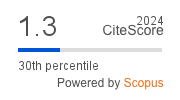DNA Epstein-Barr virus (EBV) sebagai biomaker diagnosis karsinoma nasofaring
Downloads
Background: Nasopharyngeal carcinoma (NPC) is a malignant neoplasm arising from the mucosal epithelium of the nasopharynx with various cells differentiation. Nasopharyngeal carcinoma is vastly more common in certain regions of East Asia, South Asia and Africa with viral, dietary which is typically includes consumption of salted vegetables, fish, meat and genetic factors that implicated in its causation. The undifferentiated is the most common type of NPC and strongly associated with Epstein-Barr virus (EBV) infection. Purpose: This paper was aimed to review about molecular biomarker as non invasive diagnosis of NPC especially in related to EBV infection in nasopharyngeal epithelial cells. Reviews: The pathogenesis of NPC particularly the endemic type seems to follow a multi-step process, in which EBV, ethnic background, and environmental carcinogens all seem to play important role. EBV DNA plasm level is used continuously in clinic as a promise, sensitive and specific molecular marker diagnostic that reflected the stage, treatment response and prognosis of NPC. Detection of nuclear antigen associated with Epstein-Barr virus (EBNA) and viral DNA has revealed that EBV can infect epithelial cells and associated with their transformation in carcinogenesis. Latent membrane protein (LMP-1 and LMP-2) oncogenes EBV encoded related to proliferative gene expression indicated invasive and progressive growth of NPC. Conclusion: The new biomarkers for NPC, including EBV DNA in serum; EBV DNA and BamH1-A Reading Frame-1 (BARF1) mRNA in NPC brushings have been developed for the molecular non invasive diagnosis of this tumour.
Latar belakang: Nasopharyngeal carcinoma (NPC), sering dikenal sebagai kanker nasofaring merupakan tumor ganas yang berasal dari epitel mukosa nasofaring dengan derajat diferensiasi sel yang bervariasi. Paling banyak ditemukan di Asia Selatan, Asia Timur, dan Afrika. Virus, pola diet tipikal seperti konsumsi sayuran, ikan dan daging yang diasinkan, dan faktor genetik merupakan faktor kausatif. Tipe undifferentiated paling banyak ditemukan dan sangat berkaitan dengan infeksi virus Epstein Barr (EBV). Tujuan: Tujuan penulisan ini akan meninjau pustaka mengenai biomarker molekular sebagai alat diagnostik yang non invasif untuk NPC terutama dalam kaitannya dengan infeksi EBV pada sel epitel nasofaring. Tinjauan pustaka: Patogenesis NPC terutama pada tipe endemik, merupakan proses multi tahap, dan semua faktor seperti EBV, latar belakang etnik, dan karsinogen lingkungan berperan penting. Level plasma DNA EBV digunakan secara rutin di klinik sebagai suatu marker diagnostik molekular yang menjanjikan, sensitif, dan spesifik sebagai cerminan stadium, respon terhadap pengobatan dan prognosis NPC. Terdeteksinya antigen inti yang berkaitan dengan EBV (EBNA) dan DNA virus menyatakan bahwa EBV menginfeksi sel epitel dan terkait dengan transformasi sel dalam karsinogenesis. Protein membran laten-1 dan 2 onkogen (LMP1 dan LMP2) mengkode EBV berkaitan dengan ekspresi gen pertumbuhan sel yang mengindikasikan pertumbuhan yang sangat invasif dan progesif dari NPC. Simpulan: Biomarker NPC terkiniseperti pengukuran EBV DNA dalam serum; EBV DNA dan BARF1 (BamH1-A Reading Frame-1) mRNA pada sitologi NPC telah dikembangkan untuk diagnosis molekular yang non invasif
Downloads
- Every manuscript submitted to must observe the policy and terms set by the Dental Journal (Majalah Kedokteran Gigi).
- Publication rights to manuscript content published by the Dental Journal (Majalah Kedokteran Gigi) is owned by the journal with the consent and approval of the author(s) concerned.
- Full texts of electronically published manuscripts can be accessed free of charge and used according to the license shown below.
- The Dental Journal (Majalah Kedokteran Gigi) is licensed under a Creative Commons Attribution-ShareAlike 4.0 International License

















